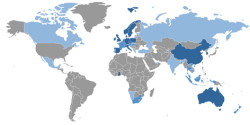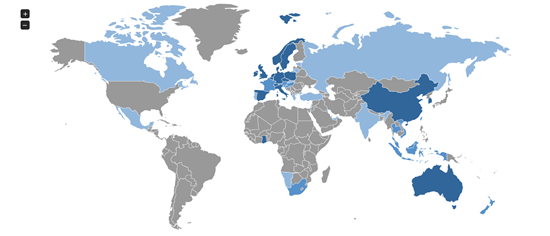Radio World and Radio.NL report that the government of the Netherlands is considering sunsetting that country’s FM band and transitioning to digital radio broadcasting. This would mean DAB+. The decision rests on the pace at which Dutch consumers adopt the standard via DAB+ receiver purchases. An economic minister says radio receiver buyers will trigger the deliberation once the market penetration rate exceeds fifty percent. But that doesn’t mean the move is a done deal. Conundrums remain about how to get local radio stations up to speed.
Given this interesting development, I thought it would be fun to hop over to the WorldDAB.org site and check out its assessment of the state of DAB/DAB+ around the globe.
For the uninitiated, engineers developed DAB, aka Digital Audio Broadcasting, via the MPEG Audio Layer II codec in the 1980s. A codec is a means of compressing and decompressing digital data for transmission and reception. Then came a more performative and efficient system based on the MPEG-4 codec, and that is called DAB+.WorldDAB has a nifty global map that shows which countries have or are in the processing of adopting DAB/DAB+. There are 21 nations with “regular” DAB/DAB+ service. Most of them are in Europe. They include the United Kingdom, the Netherlands, Sweden, Switzerland, and Spain, but also South Korea, China, Australia, and Ghana.
According to WorldDAB, about eight percent of China’s population can access DAB. Much of that availability centers around Beijing, Shanghai, and Hong Kong. Hong Kong started running DAB+ in the summer of 2011. The government granted commercial licenses to three companies, including the Digital Broadcasting HongKong Ltd., formerly known as Wave Media, which has a popular talk radio operation in that city.
Belgium, Denmark, Germany, and Switzerland have particularly extensive DAB coverage: above 90 percent according to WorldDAB.
Then there are the countries with “trials and/or regulation.” These include Vietnam, Israel, South Africa, and Indonesia. Operators in Indonesia’s capital city of Jakarta have been running DAB trials since 2006. The latest in Vietnam took place in July on the Voice of Vietnam network. There have been DAB+ demonstrations in Bangkok, Thailand this year. Hungary has selected DAB+ for its digital standard and is testing radio programs in Budapest.
Finally there are countries “with interest,” which means they’re mucking around with DAB/DAB+ but it is all sort of tentative. WorldDAB lists Canada, Estonia, Greece, India, Lithuania, Mexico, Namibia, Portugal, the Russian Federation, Singapore, Slovakia, Turkey, and the United Arab Emirates in that category.
The United States isn’t on the WorldDAB map at all. The country is committed to Ibiquity’s HD Radio standard. How is that going? Check out our HD radio coverage for updates.




